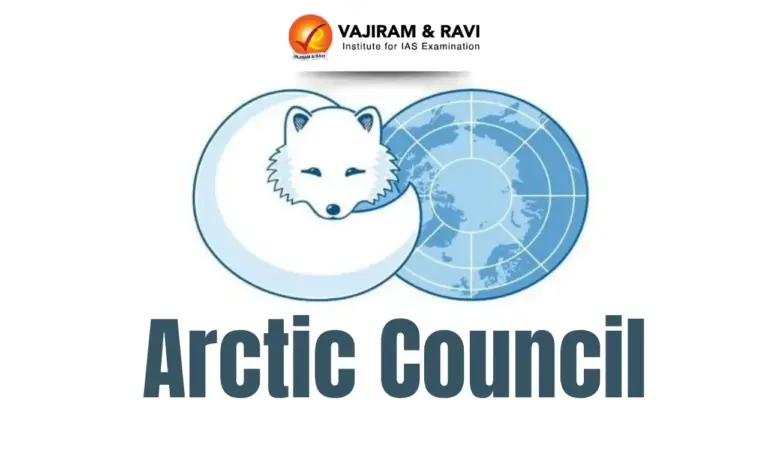Arctic Council Latest News
The Arctic region has become a global flashpoint due to rising geopolitical tensions, climate change, and resource competition.
About the Arctic Council
- The Arctic is governed by theArctic Council, an intergovernmental body formed in 1996 through the Ottawa Declaration.
- Member States (8):
- Canada, Denmark (Greenland), Finland, Iceland, Norway, Russia, Sweden, and the United States.
- These countries control land territories and have rights over resources within their Exclusive Economic Zones (EEZs).
- Permanent participants: Six Indigenous groups representing Arctic inhabitants.
- Observers (Including India):
- Thirteen countries (e.g., India, China, Japan, UK, France).
- Thirteen intergovernmental organisations.
- Twelve non-governmental organisations.
- All decisions require the consensus of the eight Arctic States and consultation with permanent participants.
The Northeast Passage
- The Northeast Passage (also called the Northern Sea Route) runs along Russia’s Arctic coastline, connecting Europe and Asia.
- Potential Advantages:
- Shortens shipping distances between China and Europe by up to 8,000 km.
- Reduces dependency on the Suez Canal, which faces security risks.
- Economic boost for Russia, as it controls access to the route.
Why is the Arctic Gaining Strategic Importance?
- Natural resources: The Arctic holds 13% of the world’s undiscovered oil and 30% of untapped natural gas. Rich in rare earth elements, phosphates, and copper.
- New trade routes: The Northeast Passage (Russia) and the Northwest Passage (Canada) are emerging as alternatives to the Suez Canal, reducing travel distances by thousands of kilometers.
- Geopolitical interests: Russia, the US, and China are increasing military activities in the region, leading to rivalry and potential conflicts.
- Climate change impact: Ice melting is opening previously inaccessible areas for exploration and trade.
- Lack of Legal Safeguards: Unlike Antarctica, which is protected by international treaties, the Arctic is primarily governed by UNCLOS (United Nations Convention on the Law of the Sea). This allows territorial claims and military presence.
Arctic Council FAQs
Q1: What is the Arctic Council?
Ans: The Arctic Council is an intergovernmental forum that promotes cooperation among Arctic states and indigenous communities on environmental protection and sustainable development.
Q2: Who are the members of the Arctic Council?
Ans: The Arctic Council consists of eight member countries: Canada, Denmark (Greenland), Finland, Iceland, Norway, Russia, Sweden, and the United States.
Q3: Does India have any role in the Arctic Council?
Ans: Yes, India is an observer state in the Arctic Council and has been actively involved in Arctic research through its Himadri research station in Svalbard, Norway.
Q4: What are the key working groups of the Arctic Council?
Ans: The Council has several working groups focusing on climate change, biodiversity conservation, emergency prevention, and sustainable development in the Arctic region.
Source: TH
Last updated on February, 2026
→ UPSC Notification 2026 is now out on the official website at upsconline.nic.in.
→ UPSC IFoS Notification 2026 is now out on the official website at upsconline.nic.in.
→ UPSC Calendar 2026 has been released.
→ UPSC Final Result 2025 is expected to be released in the first week of March 2026.
→ Check out the latest UPSC Syllabus 2026 here.
→ Join Vajiram & Ravi’s Interview Guidance Programme for expert help to crack your final UPSC stage.
→ UPSC Mains Result 2025 is now out.
→ UPSC Prelims 2026 will be conducted on 24th May, 2026 & UPSC Mains 2026 will be conducted on 21st August 2026.
→ The UPSC Selection Process is of 3 stages-Prelims, Mains and Interview.
→ Prepare effectively with Vajiram & Ravi’s UPSC Prelims Test Series 2026 featuring full-length mock tests, detailed solutions, and performance analysis.
→ Enroll in Vajiram & Ravi’s UPSC Mains Test Series 2026 for structured answer writing practice, expert evaluation, and exam-oriented feedback.
→ Join Vajiram & Ravi’s Best UPSC Mentorship Program for personalized guidance, strategy planning, and one-to-one support from experienced mentors.
→ Check UPSC Marksheet 2024 Here.
→ UPSC Toppers List 2024 is released now. Shakti Dubey is UPSC AIR 1 2024 Topper.
→ Also check Best UPSC Coaching in India


















